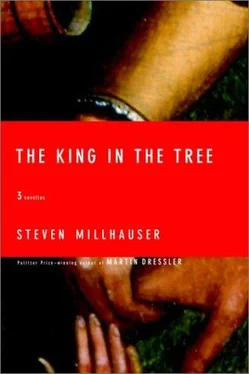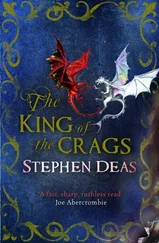“They are each of them false in different ways, surely,” remarked Georgiana.
“A third man,” Hood said, “sails to China. Upon his arrival he is stricken with a peculiar madness, which makes him believe he is in London.”
“And is the world composed only of dreamers and mad-men, Augustus?”
“Aye, and landskip gardeners, too. Now say a fourth man, an English merchant, travels to China. ’Tis the very opposite of your dreamer. He cares for naught under the sun but trading good English wool for Chinese silk. Thirty years go by and your good merchant can recollect but two things: the storm that nearly destroyed his ship, and a green river with yellow boats, which might have been in Japan. Now, by Heavens, tell me: has this man traveled to China?”
“A fifth man,” Don Juan said, “travels to China. He likes the country, travels for many years, and never returns home. Poco a poco —mmm, little by little — his early life becomes vague, dreamlike. He too has never traveled to China. He has always been there.”
“Oh, Gemini! You sound like Augustus,” Georgiana remarked, and Don Juan gave a sharp, nervous laugh — a single syllable that ended abruptly.
That night Juan sat in the walnut armchair before the casement window, looking out through burning eyes at the bend in the river as he waited for the great house to fall asleep. For some reason he thought of a dragon circling round and round its cave, settling in a corner, lowering its head onto its dangerous, peaceful claws. Deep in his chest he felt the beginning of a yawn. It rose slowly to his jaw, shuddered along the bones of his face, and floated to the top of his head, where it clung to his skull like a bat. His tiredness was so ferocious that it had become almost interesting, almost a thing of beauty. All this idiotic early rising was bad for a man. It was an unnatural form of exercise, harmful to health, disastrous to mental vigor, even — yes — morally questionable. For why should a man wrench himself from his bed in the miserable middle of the morning, after a useless night, solely in order to breathe the dangerous air surrounding a woman crackling in her clothes like fire? Better to go back to bed, close your ruined eyes, and die into the naked body of a devouring succubus. A dog barked three times, stopped, and barked once more. Juan looked about. Where was he? He was sitting in a room — in a house— in a garden — in a park — in England, a wholly imaginary country called up from depths of dream by a lustful friar hunched over a book of spells, a country inhabited by demon-women so desirable that to look at one of them for a single second was to go mad. Juan stood up. A sudden yawn shuddered through him, as if he were being lashed by an inner whip. He walked across the room, pulled open the door, and set forth in search of Georgiana.
He stepped into a corridor so black that he had to feel along the wall with one hand as he made his way slowly forward. Georgiana’s bedroom was somewhere at the far end of the house. He knew that to reach it he had to descend a staircase and make his way across the main drawing room, the dining room, the library, and a second drawing room to a stairway that led up to the apartments in the family wing. But he had never mastered the plan of the meandering mansion, with its long and sometimes turning corridors, its various wings, each with so many rooms that it was impossible for him to make his way by day across any wing without becoming lost, its many stairways going up or down, its galleries, its hidden chambers reached only by secret passages known to servants long since deceased, its wine cellars and storage rooms, its coin room and medal room, its chambers half built and suddenly abandoned, its forgotten rooms into which a chambermaid sometimes strayed with a gasp. In the corridor his fingers found the top of a flight of stairs. As he made his way down into the darkness of the drawing room, he understood that the heavy curtains had been drawn; no glimmer of moonlight on glass or polished wood indicated the way.
He advanced with his left hand outstretched, his right hand grasping his sword hilt. Suddenly he felt something cool and hard and smooth that might have been the side of a vase or the cheek of a bust. He tried to picture the drawing room carefully in his mind, but the imagined furniture kept shifting and sliding about — and in the slippery blackness he wondered whether he might have entered some other room, after descending a stairway he had never used before.
He continued forward, through the room that ought to have been the drawing room, holding out his hand in empty space. It was an odd immensity of space, as if he had accidentally stepped through a door into a black meadow — and who was to say he had not stepped into a meadow, or into the orchard that went down to the Guadalquivir? Slowly he advanced across the meadowy room. Then he began to wonder whether he was moving in a straight line, perhaps he was veering a little with every step, so that he was doomed to turn forever in this desolate black place, a Sisyphus without a rock — and as he set down one foot after the other, in the deliberate and thoughtful manner of a man who had every reason to suppose that he would arrive at his destination, even though he no longer remembered it, the outstretched fingertips of his left hand seemed to quiver, like the antennae of an insect.
Something struck his knee. It was neither soft nor hard, a soft hardness that might have been part of a piece of furniture, but when he bent to feel it he could feel only empty air, as though an animal had come up against him and wandered away. Then his shoulder knocked into a hard object that wobbled, began to fall, and did not fall. He took another step. His fingers struck something flat and smooth — it appeared to be a wall — and following the smoothness, Juan came to a closed door that opened into another darkness.
It should have been the dining room, if the meadow had been the drawing room, but as he advanced along the wall he came to what seemed to be a carved cabinet. He tried to remember a carved cabinet in the dining room, though wasn’t there one in the drawing room? — in which case he was already hopelessly lost. For that matter, the cabinet had begun to seem less like a cabinet than like a large beast carved in wood. On the other side of the chest-beast he felt the wall again, then the edge of something that might have been the frame of a mirror or the high back of a chair, and again the wall. Soon his fingers came to an opening that seemed to be a doorway without a door. He passed through into another blackness — perhaps a new room, perhaps only a recess or alcove — and as he stood wondering whether it might be possible to return through the no longer visible opening, he became aware of a small light glimmering in the dark.
He saw the shape of a far doorway, through which a figure with a candlestick was advancing slowly. The white gown was unhooped and flowing, a ghost in a wind. On her head was a pale hat with a wide brim.
As Mary came closer, she raised the candle toward his face and said teasingly, without surprise, “Why, Sir Juan! You really are a ghost. I’m feeling much better, thank you.”
Her face, radiant in the candlelight, seemed to glow from some inner light. When she stopped before him she dropped her voice to a conspiratorial whisper. “Shhh. You mustn’t tell anyone, Sir Juan. ’Tis a secret, you see. But I can tell you. ” She hesitated. “I’m going down to the river. I mustn’t be late. Don’t tell Georgiana.” She laughed lightly, then became grave. “You look tired, Monsieur Jean. Why are you not asleep? Oh, but I know. Night after night they roam the earth from dark to dawn, never resting. That is what ghosts do. ’Tis our job, Sir John. I’faith we cannot do otherwise. Shhh. Soon everything will be all right.” By the light of her candle he saw with surprise that he was in the supping room, an informal room off the main dining room where, as Hood had once explained, supper used to be served, although now he was converting it into a second library. She lowered her voice again. “You mustn’t follow me tonight. No-no-no-no.” Slowly she wagged a warning finger back and forth. In her wide, childish eyes he saw trembling candle flames. “Sleep well, Don Juan,” she said, moving past him toward another doorway. He watched her light until the darkness devoured it.
Читать дальше












